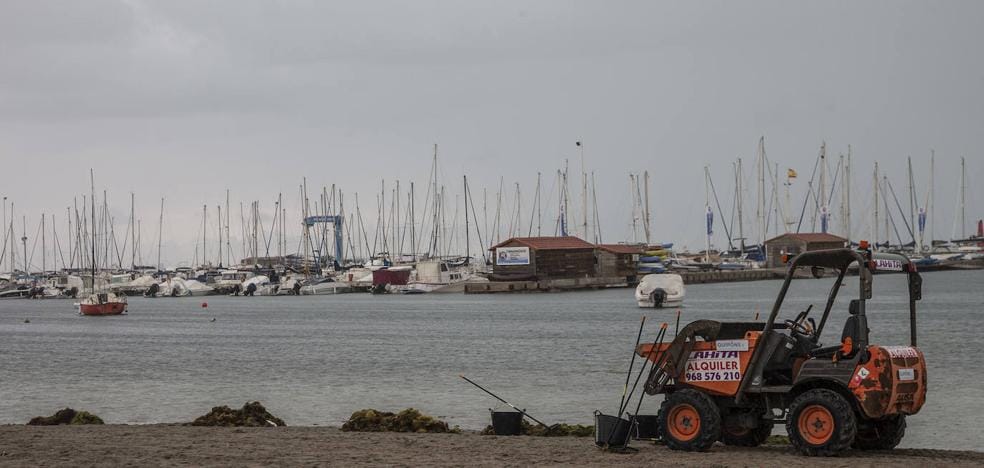Biomass removal machinery, this Wednesday in Los Alcázares. /
“We are seeing a significant proliferation of algae, specifically that known as ‘angel hair'”, explains the councilor Antonio Luengo
The regional government currently has 90 troops for the daily removal of biomass from the beaches of the Mar Menor “to prevent its accumulation from contributing to the degradation of the ecosystem” and for which a total of 5 has been invested since 2017 .6 million euros.
These figures were offered this Wednesday by the Minister of Water, Agriculture, Livestock, Fisheries and the Environment, Antonio Luengo, during his visit to the Los Alcázares Yacht Club, from where he was able to check the tasks of the cleaning brigades, as well as the fishermen who these days have joined these tasks, “helping the municipalities in a municipal task, but to which the regional government is added with a continuous investment and distributing the brigadistas through the areas that need greater reinforcement.”
“We are seeing a significant proliferation of algae, specifically the one known as ‘angel hair’ (Chaetomorpha linum), which are the direct consequence of the massive inflow of water through the boulevards, fresh water loaded with nitrogen”, warned the councilor .
“Unfortunately, no one can say that this is a surprise since since September 2019 we have been demanding that the Government of Spain act based on its powers, to put an end to the entry of water through boulevards and lower the level of the aquifer, putting in The measures included in the Zero Discharge Project are under way, especially the North Collector project, as a priority and urgent measure to avoid damage to the Mar Menor.
“And unfortunately these requests have also fallen on deaf ears because, almost four years later, the Government of Spain has done absolutely nothing to avoid the image that we find today,” he explained to the media. “Neither have they implemented any measures to reduce the high level of the aquifer, nor have mechanisms been activated to collect water from the boulevards, nor do they use the pumping of the Albujón boulevard to its maximum efficiency, so we demand that the minister report on urgently what measures are going to be adopted as soon as possible to prevent the damage from being greater, “warned the counselor.
As for the parameters that permanently measure the state of the ecosystem, the data from April 19 showed an average oxygen level of 8.37 mg/l, chlorophyll at 1.14μg/L, salinity at 39, 53 PSU and turbidity at 1.26 FTU. On the other hand, the average temperature rose to 19.12 degrees Celsius.
#regional #government #troops #daily #removal #biomass #beaches #Mar #Menor







